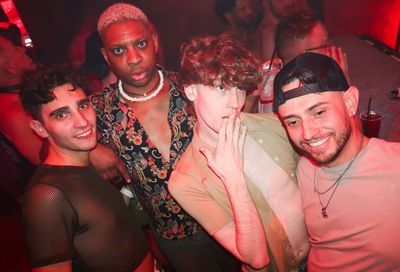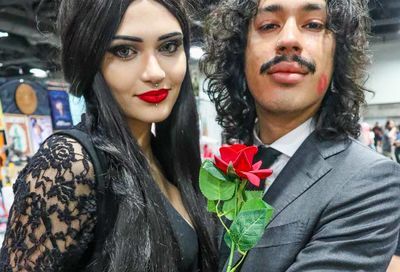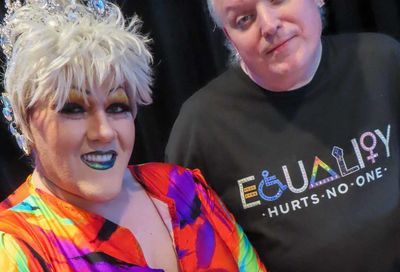Everyday Terror
Learning Curve
On the second anniversary of the September 11th attacks I thought about the kinds of “domestic” terrorism that America has chosen to ignore for so long — namely, hate crimes against gay people, particularly the bullying of gay youth in school halls. I was lucky to escape that kind of torture, as a “popular ” girl with a series of boyfriends in adolescence. However, there was a period in eighth grade when I was harassed daily by a group of meaner, cooler girls, the ones who hung out in the bad-girl/smoker bathroom between classes, and I felt then what many kids endure: the dread of going to school each day for fear of what they may do to you when no one is looking.
That sort of terror, as experienced by gay kids, is finally being addressed thanks to the endless work of organizations like the Gay, Lesbian and Straight Education Network (GLSEN) and the earthshaking reality of successful lawsuits against apathetic schools that failed to protect gay students from perpetual victimization by bullies. Though some critics fault the establishment of separate safe-harbor schools for gay kids, like New York City’s Harvey Milk High School, extraordinary persecution sometimes calls for an extraordinary solution.
Kevin Jennings, the longtime head of GLSEN, has often remarked in his conference speeches that liberals and conservatives should be able to reach agreement that violence does not belong in a school, and thus a stance against bullying should naturally be bipartisan, whatever one’s view on gay rights. Unfortunately, too many educators and authority figures continue to allege that “out” gay students “bring trouble on themselves” by existing, unaltered, within a homophobic society.
For women, too, homegrown terrorism has long failed to stir a response from Congress. Domestic violence is certainly one form, and another is the more organized terrorism of campaigns against abortion clinics. The recent execution of convicted murderer Paul Hill, whose attacks on abortion clinic workers did end with his capture and punishment, created chilling publicity as Hill smiled into television cameras and announced he expected a big reward in heaven for his acts. The notion of a heavenly reward for murder in the name of religious belief sounded oddly similar to the misguided jihad recruits who claim to wage holy war for Allah. Just as extremists should not represent the real message of Islam, Paul Hill and his fans/followers should not be permitted to speak for compassionate Christianity. Yet the existence of Christian terrorists who prey on abortion providers is a troubling face of America we have yet to confront in our alleged war on terror.
Lesbians have been forced into the drama of attacks on abortion providers for several reasons. Although we may not choose to have sex with men, we are all nonetheless vulnerable to unwanted pregnancy through sexual assault. I know far too many strong lesbians who are survivors of rape. Many of us prefer the healthcare services offered by feminist clinics, where staff are more knowledgeable about sexual assault and less judgmental about lesbianism; clinics that offer abortion services usually also offer other gynecological care and counseling, much of it appropriate to lesbian life.
Lesbians who march in abortion rights parades wearing buttons that say “Another lesbian marching for straight women’s rights” are not denying that we, too, use women’s clinics for many reasons. But those of us who spent much of the 1980s protecting abortion clinics from blockades by Randall Terry’s Operation Rescue are aware that Terry recently resurfaced, with a new campaign focus: organizing against gay rights. Because Terry’s followers, in the past, included fanatics willing to commit acts of violence, there’s reason to feel concern again. And there’s reason to hope that straight women who relied on our physical protection of abortion clinics will join in protecting lesbians from any forthcoming threats.
So when I attended 9/11 memorial tributes and heard various speakers attest that the attack was the moment when Americans lost their sense of safety, I had to shake my head in sorrowful disagreement. The sudden loss of so many, the dramatic destruction of architecture, the vulnerability radiating across a nation unused to surprise attacks since Pearl Harbor — no one can deny the psychological effects. Yet so many Americans were already accustomed to a lack of safety in their daily routines, whether dreading violent attacks from their own partners, in their long schooldays, or during a perfectly legal medical appointment at a women’s clinic. More recently, a spate of attacks against transgendered Washingtonians has forced attention to a whole other strain of local terrorism. And the question remains whether we see assaults in those environments as offenses worthy of national vigilance.
Bonnie J. Morris, Ph.D., is on the women’s studies faculty at George Washington University and Georgetown University. She can be reached at bmorris@metroweekly.com.
Support Metro Weekly’s Journalism
These are challenging times for news organizations. And yet it’s crucial we stay active and provide vital resources and information to both our local readers and the world. So won’t you please take a moment and consider supporting Metro Weekly with a membership? For as little as $5 a month, you can help ensure Metro Weekly magazine and MetroWeekly.com remain free, viable resources as we provide the best, most diverse, culturally-resonant LGBTQ coverage in both the D.C. region and around the world. Memberships come with exclusive perks and discounts, your own personal digital delivery of each week’s magazine (and an archive), access to our Member's Lounge when it launches this fall, and exclusive members-only items like Metro Weekly Membership Mugs and Tote Bags! Check out all our membership levels here and please join us today!




















